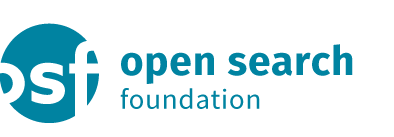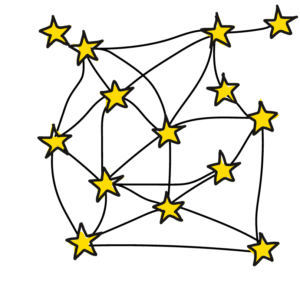“We urgently need the open index to build European AI systems”
Interview with Prof. Dr. Dieter Kranzlmüller, Head of the Leibniz Supercomputing Centre (LRZ) and the Chair of Communication Systems and Systems Programming at the Ludwig Maximilian University of Munich (LMU).
Interview: Susanne Vieser
Research results everyone can read; data on society, the economy, the environment and technology everyone can use and evaluate: Dieter Kranzlmüller is a researcher, curious by profession and open to any form of data. He holds a doctorate in computer science and is head of the Leibniz Supercomputing Centre (LRZ), one of three supercomputing centers in Germany, and OSF’s project partner in the EU project OpenWebSearch.eu.
Kranzlmüller first became personally involved with the Open Search Foundation, but soon brought in the expertise of the LRZ: The first Open Search Symposium (Ossym) was held there in 2016, and in addition, many LRZ specialists are now involved in building the open web index, and the LRZ clusters are also doing the calculations for the open index. – An interview about online search in times of artificial intelligence (AI), about research and teaching on a value-based Internet.
How do you search personally and professionally? Are you always satisfied with the results?
Prof. Dr. Dieter Kranzlmüller: Online searches are relevant for many things – in my private life, I often search for leisure and cultural activities, book titles and authors, or movies. As a computer scientist, I search for experts on specific research topics or for interesting scientific results on my own questions. Besides new processor concepts and computer architectures, I am very interested in the ethical aspects of computer science. Unfortunately, I find that the search results do not always satisfy me. Often advertisements are suggested to me, which fit my question, but unfortunately push the really relevant results to the back. Sometimes I have to scroll through the results several times to finally get to the important findings. And then I ask myself how the ranking came about in the first place. By the way, my previous experiences with ChatGPT were similar: somehow the artificial intelligence provided an answer that seemed to make sense, but on closer inspection I either had to follow-up or ask my question with different details. So not satisfying yet either.
The Leibniz Supercomputing Centre and you personally supported the Open Search Foundation early on – why?
Kranzlmüller: I am a great advocate of Open Science, Open Data and Open Source, i.e. of openly accessible research results and data as well as of software whose source codes are transparent and which can thus be adapted or further developed to meet a wide variety of needs. This is the only way to create many different opportunities and personal benefits. The Open Search Foundation advocates open, transparent online search, which is also very important to me.
Why?
Kranzlmüller: Democracy and personal freedom are based on knowledge and information. Search services do support information gathering, but in order to be able to classify and evaluate the content found, the search algorithms should be transparent and the rankings of the search results should be neutral, i.e. uninfluenced by any forces or interests. Or at least the criteria used for sorting should be made public.
Is the topic of web search, search behavior, data ethics actually on the agenda of teaching and research in computer science, including yours?
Kranzlmüller: My lecture “Computer Networks and Distributed Systems” covers the basics of how the Internet works and how it can be used as a basis for search. For this, I also show pictures of the first Google search engine from the Computer History Museum in Mountain View, for example. The lecture “Grid and Cloud Computing” is then more about the use of Google’s MapReduce programming model, which allows multiple calculations, instructions or commands to be executed simultaneously to handle large amounts of data. I also deal with data ethics and offer the seminar “Data Ethics” in the master’s program in Data Science – where we discuss legal and ethical issues, such as the handling of personal data, data security, or the planning of experiments in data science. How openly accessible can the IT systems of public authorities or research institutions be, especially in times of war? How private or anonymous should everyone’s Internet use remain in the face of hate speech and cybercrime? How do we tackle fake news and false reports? And how strongly should we regulate AI systems? It is always exciting to observe how differently freedom and rights are interpreted in the seminar, or where and how rules or limits are demanded.
What does the LRZ contribute to the open Web index?
Kranzlmüller: While companies can set up server farms around the world to collect and categorize information from the Internet, the open Web index relies on a collaborative model for cost reasons and to achieve the required transparency, i.e., on data centers like the LRZ that use free capacities to set up and later use the index. At present, it is mainly scientific computing centers that participate, but this does not have to remain the case; companies can and should also participate. In addition, the LRZ is involved in the European research project OpenWebsearch.EU and also contributes technical infrastructure, computer resources and experience with the organization and coordination of research projects.
We are currently reading a lot about AI and ChatGPT, they will change web search: Do we still need an open web index at all?
Kranzlmüller: Absolutely! The problem with current approaches to generative AI – i.e., tools that fabricate new texts, images, code or synthetic data from data – is that the necessary data is held by a few providers, in the case of ChatGPT by Microsoft and OpenAI. We therefore urgently need the open index to build sovereign, European, generative AI systems.
The LRZ is involved in the OpenWebSearch.EU research project: How important is the project for its strategy?
Kranzlmüller: The core task of the LRZ is to support research and science, and we align our strategies, technologies and IT services accordingly. Researchers cannot work with commercial, mostly secret indexes; they can neither analyze nor experimentally change functionalities. If we succeed in creating an openly accessible index for online search, researchers can use it for their own search approaches. Hopefully, this will lead to many different ways of obtaining information, which may even result in new commercial services. From the LRZ’s point of view, an open web index can become an IT service for researchers. Similarly, together with the German Aerospace Center, we have built terrabyte, a platform for high-performance data analysis. This makes DLR’s Earth observation data openly accessible to researchers – along with the techniques and tools with which they can be analyzed.
Just look into the future: How will we be searching in five years?
Kranzlmüller: In any case, we will probably work less with keywords and more with texts or perhaps even voice interfaces, i.e. audio and voice files. Search will become more interactive – we’ll ask a question, be able to inquire, specify, and more. I also suspect that the interface will become more multimedial. Online search services will soon provide not only links and text for answers, but also images, videos or audio formats.
Prof. Dr. Dieter Kranzlmüller
Head of the Leibniz Supercomputing Centre (LRZ) and Chair of Communication Systems and Systems Programming at Ludwig-Maximilians-Universität München (LMU)


